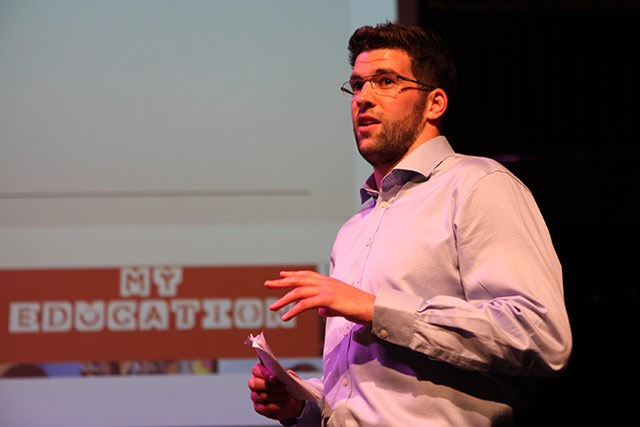It’s no use putting better opportunities on the menu if the young people they’re aimed at have no idea how to get a seat at the table

If the #SkillsBill has a chance at genuinely improving opportunities for all it must be accompanied by a sharp increase in careers guidance, particularly for disadvantaged learners, says Dominic Baker.
In the UK today, the income of the family you are born into is still the strongest indicator of where you’ll end up.
The government describes its ’Skills and post-16 Education Bill‘ (put before parliament on Tuesday May 18th) as ‘a vital reform to post-16 education so more people can gain the skills needed to secure great jobs.’
It’s hard to argue with that – and of course, as a charity that exists to help young fulfil their potential in post-16 education or training, we’re delighted to see greater focus on this critical transition point.
High-quality careers advice and guidance from an early stage
But in reality, the ‘rocket fuelled skills revolution’ promised by the Prime Minister in his Queen’s Speech needs to come earlier in his ‘levelling up’ agenda if it is to genuinely make a difference.
We need to see an investment in high-quality advice and guidance from an early stage to help young people identify and access post-16 education and training opportunities that will enable them to make the most of their skills and talents.
One of the key measures introduced in the Skills Bill are new powers to intervene when colleges are failing to deliver good outcomes for the communities they serve, and we certainly welcome the spotlight being shone on course quality.
But ensuring all young people have access to a good course starts much earlier – with career education in schools.
In other words, It’s no use putting better opportunities on the menu, if the young people they’re aimed at have no idea how to get a seat at the table.
At Future Frontiers, we find, over and over again, that this is the real gap which needs addressing: efforts to level the playing field for young people must consider the critical role careers information, advice and guidance plays in unlocking the potential of young people.
Only one in four disadvantaged students secure a Level 3 by the age of 19
We know that the decisions young people make at 16 have lifelong consequences – too many fail to progress to and sustain quality education or training that provides a gateway to secure and meaningful employment. This is particularly prevalent amongst young people from disadvantaged backgrounds – nearly three quarters of whom will not secure a Level 3 qualification (the equivalent of 3 A Levels) by age 19.
Many young people from low socio-economic backgrounds have limited awareness of their career options and don’t have the ‘social capital’ and family connections to support them with the research, planning and choices required.
Before starting our programme, less than half of the pupils we work with believe they can reach an inspiring career. Young people tell us that they are uncertain of their future plans and even if they do have a career goal in mind, they are unsure how to realise it.
Often students haven’t really thought deeply about what they’re going to do post-16. Many of them just expect to stay at school and are shocked when they’re not offered a place at Sixth form – even though over half of all London 16 year olds leave school after GCSEs and in the rest of England, the proportion is even higher, with 70% switching to another form of higher education.
The post 16 landscape can be a minefield
If you’re not in the minority, staying at school and taking A levels and navigating the post 16 landscape can be a minefield – even experts in the field continue to describe its bewildering and overwhelming.
Young people need expert, local and personalised knowledge to help them find and apply to high quality courses they are likely to thrive in. The current expectation of a 30 minute 1:1 session is woefully insufficient to support young people to make carefully-considered decisions – particularly when you consider the fact that many young people won’t be supplementing this support with guidance from elsewhere. This support needs to come early on – not at the last minute in Year 11 when college application deadlines are looming – and needs to be delivered by people with excellent knowledge of the local education and training landscape.
The value of expert careers advisors cannot be underestimated, and ensuring young people have access to this guidance must be a priority. However, school staff also need to be upskilled in non-academic routes, supporting students to make the decisions that are right for them. Students frequently tell us teachers are well versed in GCSEs, A levels and university options, but most know very little about the world of work or vocational training.
Increasing opportunities alone is not enough
And finally, we need to ensure that guidance for young people does not stop once applications have been submitted. Too many young people fall foul of the first-come-first served approach in post-16 enrolment and are funnelled into unsuitable courses after GCSE results day. The current system favours the well-informed and well-prepared, leaving young people without the confidence or knowledge to advocate for themselves even further behind.
We must learn our lessons: we saw with the apprenticeship levy that increasing opportunities alone is not enough. The levy disproportionately funded higher-level apprenticeships for learners from advantaged communities and we must ensure that the investment in new courses doesn’t perpetuate the same old inequalities, where quality courses go to those who already have a seat at the table.
Dominic Baker is the founder and CEO of Future Frontiers.
Future Frontiers is an award-winning education charity that provides young people with face-to-face coaching, 1:1 careers advice and access to professional role models to ensure they fulfil their potential at school and when transitioning to post-16 education or training. Future Frontiers will support 2000 students next academic year through partnerships with over 100 schools and businesses in London.











Responses